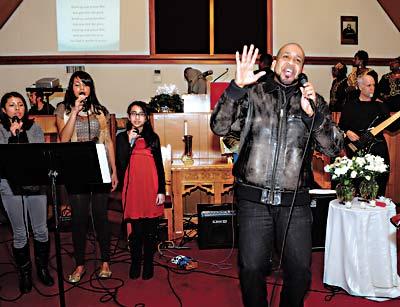Honoring M.L.K.’s Legacy

The cold temperature was no deterrent for the crowd that packed the Calvary Baptist Church in East Hampton on Monday to sing, listen, and pay tribute to the Rev. Dr. Martin Luther King Jr., described as “one of the most transcending humans of all times” by the afternoon’s keynote speaker, the Rev. Michael Jackson of Triune Baptist Church of Sag Harbor.
Joining Calvary Baptist’s pastor, Charles Earle Hopson, at the memorial service were the Rev. Marvin Dozier of Unity Baptist Church in Mattituck and Pastor Oswaldo Palomo of the Vida Abundante/Living Water Church in Wainscott.
Mr. Palomo started off the event by quoting Dr. King: “Darkness cannot drive out darkness, only light can do that. Hate cannot drive out hate; only love can do that,” and then advised the celebrants “to bring light into this community.”
Dave Cheney was the master of ceremonies, and there were performances by the youth choir of Calvary Baptist Church, the Triune Baptist Church choir, and a choir from Wainscott hurches, with Klever Prieto, a soloist.
The event doubled as a benefit for the Calvary Baptist Church’s Martin Luther King Scholarship fund, which aid students in financial need. “We can afford to send four students to college,” Mr. Cheney said as donations were collected.
The crowd included a number of local school and government officials, among them East Hampton Village Mayor Paul F. Rickenbach Jr., East Hampton Town Supervisor Bill Wilkinson, town council members Dominick Stanzione and Sylvia Overby, Richard Burns, the East Hampton School District’s interim superintendent, and Christopher Tracey, principal of the John M. Marshall Elementary School. Lucius Ware, president of the local chapter of the N.A.A.C.P., was also in attendance.
Mr. Jackson spoke of Dr. King’s many accomplishments, including that he was the youngest man to receive the Nobel Peace Prize in 1964, at the age of 35. “His life and time captured this nation. And he challenged the status quo to have it live up to its foundation,” he said.
Mr. Jackson also discussed how Dr. King was able to persevere with humor and respect for others in the face of the daunting task before him. “He was more than a civil rights leader. He was more than someone who was thrown into the political arena. He was a preacher, with a purpose to lift up the disenfranchised, and stand up for justice,” Mr. Jackson said.
He talked about Dr. King’s nonviolent demonstrations, referencing his respect for Mahatma Gandhi. “The true essence of who we are is found in the moments of crisis,” Mr. Jackson said, “and the critical moments of a standoff.”
Mr. Jackson said Dr. King was “a leader who dared to dream and hope, but he pressed on. Even in the midst of dogs released on him, and pepper sprayed, he pressed on.”
“How many of us have that courage?” he asked.
In his own era, Dr. King suggested we would have tough times ahead, Mr. Jackson said. “A revolution is taking place; we’re in the pivotal moment of our history right now. There is uncertainty and instability.” Referring to Dr. King’s tactics when handling conflict, he said, “We take a stand because it is the right thing to do.”
“True leadership is never a given, it is earned by your character, and what you do,” Mr. Jackson said.
He questioned what Dr. King would have to say about Iraq, Afghanistan, and Iran. “One day instead of going into these places, we will study war no more,” he answered for Dr. King.
The ceremony concluded with everyone joining together to sing “We Shall Overcome.”
